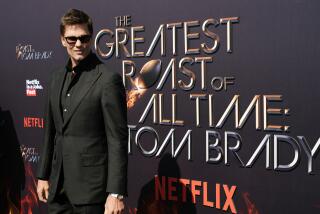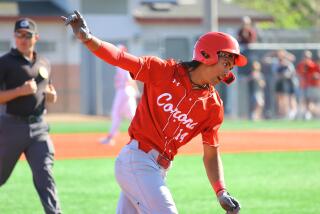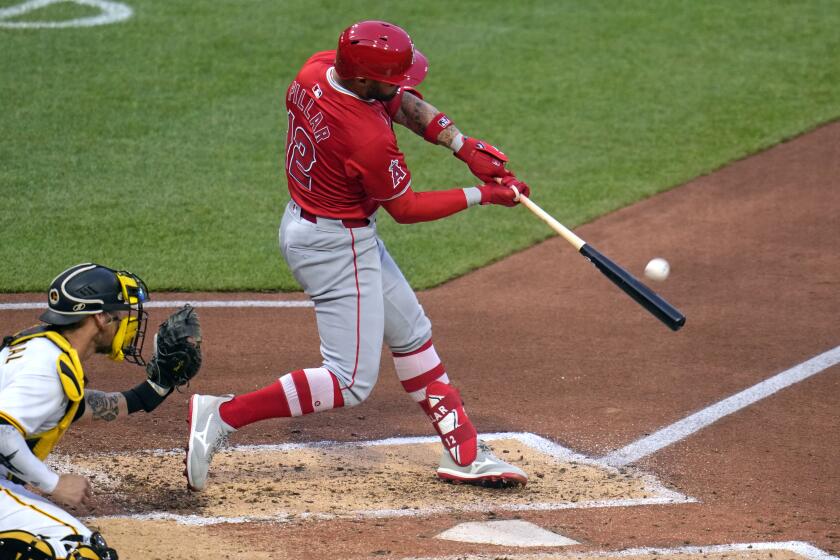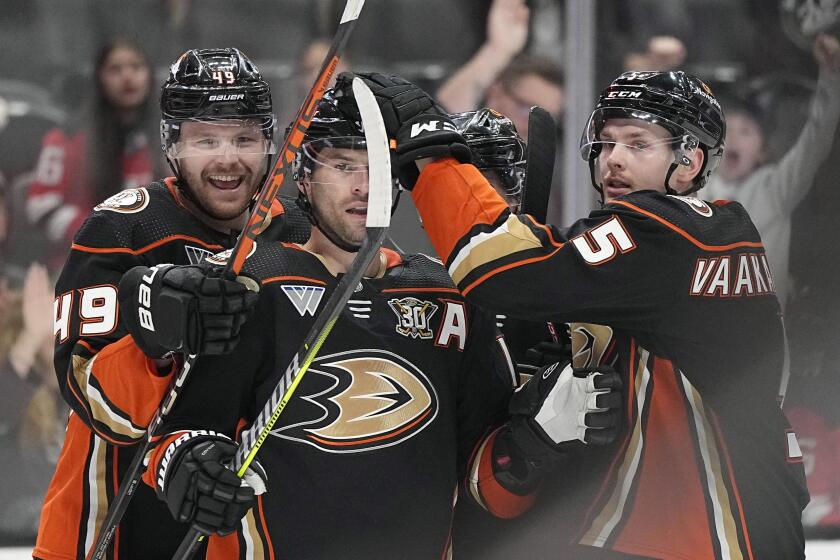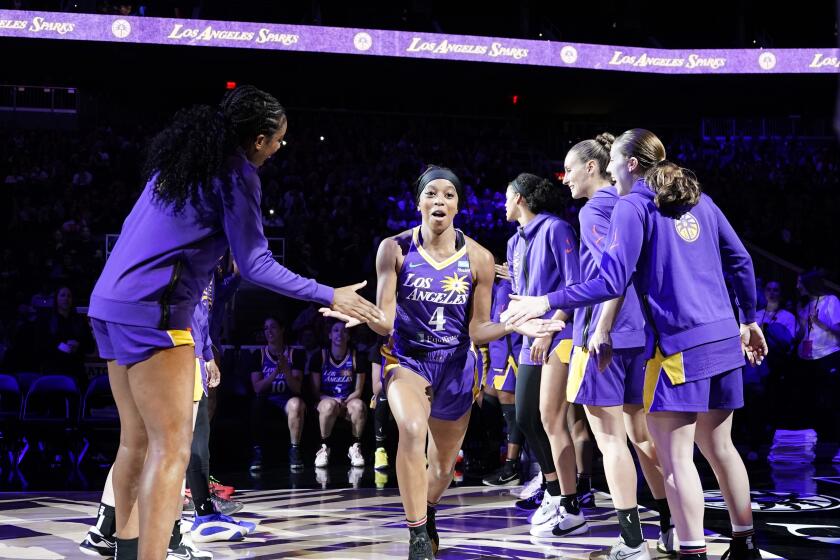SUPER BOWL XXI : THE AFTERMATH : Pro Football / Bob Oates : Broncos Had Their Chances but Didn’t Play It Cool, They Ran
When the Super Bowl game was over, Times sportswriter Richard Hoffer asked the key question: “What to do with a team, famous for its gadget plays, that runs three times from the one-yard line?”
Denver’s Broncos, who did that Sunday, didn’t have a good answer afterward for their conservative goal-line offense. And they still don’t.
The truth is that they lost a title game they could have won from the better team with a better game plan.
The decisive difference between these organizations, this time, was that the New York Giants were ready with the plays that had to be made to win it--the right passes, the right runs--and Denver wasn’t.
That was the theme of Super Bowl XXI.
To be sure, the Giants went in as the stronger team. They figured to win for that reason. But they won not because they were stronger but because, as coached by Bill Parcells, they were the smarter team.
This was evident as early as the first quarter, when the Giants, on a long drive, came down to the Denver six-yard line.
Before and afterward, the Broncos figured that they couldn’t pass successfully down there. They tried to run on the goal line, and lost the game, 39-20, when, to no one’s surprise, they couldn’t.
The Giants, however, near Denver’s goal line, passed the ball on the biggest play of the first quarter. More important, they were ready with the kind of first-down pass that almost guaranteed the six-yard touchdown they got.
On that play, the Giants encouraged Denver to think run by sending in a second tight end, Zeke Mowatt, who lined up on the right side of their line and went in motion.
Then, as quarterback Phil Simms faked a running play, Mowatt went into the end zone and cut sharply back to his right. The Broncos, mystified, had nobody on him when Mowatt caught Simms’ touchdown pass.
Now, that’s football. That’s the kind of play good teams are ready with on the goal line of a big game.
In almost the same spot later, by contrast, with time running out in the second quarter, the Broncos threw a routine pass on third and five from the New York 16. They threw it to the right player, 6-foot 5-inch tight end Orson Mobley, but the play fooled no one. The Giants had Mobley routinely surrounded, and so at halftime they were down only 10-9, instead of 17-9.
From one quarter to the next, Parcells had the Giants ready Sunday with the right play at the right time: a special kind of fourth-down fake punt, an ideally timed flea-flicker pass, a third-and-five run to his left by Joe Morris, who almost always runs right.
The Giants didn’t just assume that Mowatt would be open at a critical moment, or that Morris could run for a critical first down on third and five, or that a fake punt would succeed automatically. They put a spin on those plays. They tricked up the game’s big decisive plays.
The Broncos, unaccountably, didn’t. A famous gadget bunch, the Broncos strangely tried to outmuscle the larger Giant team in their moments of opportunity. And it killed them.
Ironically, Denver quarterback John Elway has the kind of arm it takes to whip New York’s kind of zone defense on the goal line.
It takes velocity there. And Elway has the velocity.
With three shots from the one-yard line, Elway could have tried a quick, hard one on first down, throwing the ball away if it wasn’t there. He might have sneaked on second down, or even on second and third. Most important, to win this game, the Broncos needed something special for Elway on the goal line.
They didn’t have it, though, and it was clear that they couldn’t run on the Giants, there or anywhere else. Almost every run the Broncos called in Super Bowl XXI was a wasted play. They knew it, the Giants knew it, the 100,000 present knew it, most of the millions at home knew it.
The only asset Denver had was a unique quarterback. But even a unique quarterback needs a helpful game plan when he’s up against a team that’s much stronger than his.
For the last three years, Dan Reeves of the Broncos has been perhaps the AFC’s best coach--maybe the NFL’s best when you put those three years together and consider the talent he doesn’t have in Denver.
But this time Reeves didn’t make the most of Elway.
NFC teams have won five of the last six Super Bowls.
The NFC--the successor to the old NFL--has finally become what its supporters thought it was 18 years ago when Joe Namath shot it down.
“The NFC is the more physical (conference) today,” Simms said Monday. “Washington, the Bears, are bigger and stronger. That’s the way we are, too. The AFC has fast people. Denver is typical.”
That’s one explanation, but there may be others. The AFC’s historically leading teams are all in disarray at the moment. The Raiders, for instance, are between quarterbacks. The Miami Dolphins are between defenses.
Moreover, the NFC in recent years has greatly improved its leadership--with Mike Ditka in Chicago, John Robinson and Bill Walsh in California, Joe Gibbs and Parcells in the East.
More than a year ago, Raider owner Al Davis said privately: “Parcells is the comer, the game’s best new head coach.”
Many Giant fans at Pasadena Sunday doubtless reflected that for three months this season, they didn’t have an overpowering team.
The New York majority was still booing Simms in those days when the Giants were winning without him, almost every Sunday, by two or three points.
“We’ve gotten a lot better in the last six weeks,” Parcells said.
Specifically, Simms has gotten a lot better. Why?
“(Parcells) is a very supportive coach,” Simms replied, thinking, no doubt, of the early season weeks when he was a 5-for-20 passer--that is, when he was completing nearly 5 of every 20.
“(Parcells) came up to me one day, and during the conversation said: ‘I think you’re a great quarterback. I know you’re a great quarterback.’ I was looking for support, and he gave it to me.”
Simms had been wondering about that through the Giants’ first 12 games, when they usually gave Morris the ball on third and six or seven, ignoring Simms.
But, in the 13th game of their season, when the Giants desperately needed Simms after falling behind in San Francisco, 17-0, he knew--or at least he believed--that he had Parcells’ confidence. Thus, in that blackest hour of the season for the Giants at Candlestick Park, Simms confidently pulled it out, 21-17.
And because Parcells has let him throw the ball ever since, the Giants have blown out their last seven opponents--some of whom they had earlier beaten by three or four points.
“Sure, I told him he was a great quarterback,” Parcells said. “And I meant it.”
Whether he meant it is really irrelevant. For in playing quarterback, as in many other difficult pursuits, self-confidence is much of the job. The good coaches all say so, and Simms proved it again Sunday, confounding the thousands of New Yorkers who were booing him only a few weeks ago.
More to Read
Get our high school sports newsletter
Prep Rally is devoted to the SoCal high school sports experience, bringing you scores, stories and a behind-the-scenes look at what makes prep sports so popular.
You may occasionally receive promotional content from the Los Angeles Times.
